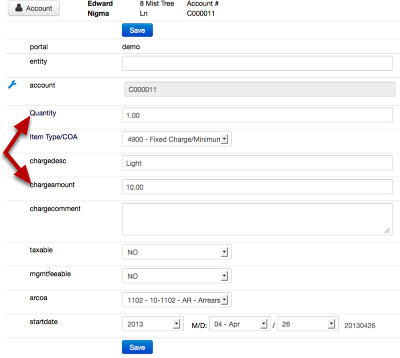Arrears
Fees can be added to customer accounts as arrears. Please keep in mind; while it may not be a legal issue, it increases customer confidence when fees are published publicly. People are less willing to pay when they feel cheated. Any debt incurred by the customer should be added to the account as an arrears.
Arrears
Arrears is a useful concept for prepaid billing because it allows the system to handle debt from a legacy system, bad check, meter tampering or damaging, and reconnect fees. While Juice does not have a disconnection charge, arrears may be configured to allow this functionality.
Adding arrears to an account will vary from one installation to the next. The Arrears COA type is mapped individually, but will normally cover items like legacy arrears or doubtful arrears. It can be used for other items, not related to penalties or debt. It can be used to assist customers with projects they can pay over time, or used to forgive debt (write off) with a repayment plan (adding a smaller arrears).
Debt Recovery
Juice prepayment software allows customers to be able to be able to have power where they simply couldn't on a postpaid account. One way this is possible is with arrears payment plans. Juice has the ability to deduct a specific percent from each transaction to pay for arrears. This percent defaults to 100 but may be selected at the time of arrears creation. Arrears may be added to a customer's account at anytime but most often is used to transfer debt from the legacy billing system to Juice during account set-up.
Multiple Payment Plans
Customers with multiple payment plans will often have questions about how their payments will be applied. Juice payment application allows either:
- Apply the amount of the payment to one or more specific arrears.
- Use the default arrears payment logic.
Any payment via API will use default arrears logic. The default logic will check the age, payment plan, and count of arrears. First all 100% arrears will be separated from other arrears. The 100% will be paid in full, oldest first. Then remaining arrears will be counted, in this example we have three 25% arrears. The amount to pay the remaining arrears will be calculated using the full payment amount multiplied by the payment plan percentage. The product will be divided into the number of unpaid payment plans rounded to the nearest cent equal to or less than remaining payment amount. Finally the rest of the payment amount will be used for electricity. An example if this customer pays $100.00:
- The four payment plans are split into two groups: one for 100% arrears and one for 25% arrears. (Payment balance: $100.00)
- With only one 100% arrears the age does not matter. $50.00 gets applied to this arrears. (Payment balance: $100.00 - $50.00 = $50.00)
- The percentage for each of the three 25% arrears is calculated, each arrears will receive 8.33% of the original payment amount, or $8.33. (Payment balance: $50.00 - ($8.33*3) = $25.01)
- Finally the remainder is used to buy power. (Payment balance: $25.01 / rate = kWh)
Fixed Charge
Juice allows utilities to have recurring charges applied monthly for unmetered services like garbage collection, street lighting, or other assorted fees. Fixed charges may also be edited for quantity, amount of charge, and more. Note the start date would be the effective date of the charge. For a prepaid customer the fixed charge will be due and payable that day. Also the two COA fields will reflect what Juice will store in the GL.
Write off
Juice also has the option to write off arrears. This option will check the system user's special limit (this limit is distinct from the vending limit). The amount field will allow any amount up the total amount owed or the special limit, whichever is lower. When the amount is entered it can be applied to any arrears available and selected. Similar to payments applied to arrears, the system default will apply the amount to oldest arrears first. Once finished clicking next will show a confirmation screen and clicking Confirm will apply the write off to the affected arrears.


